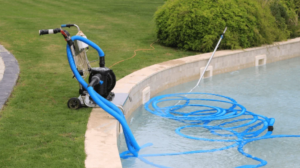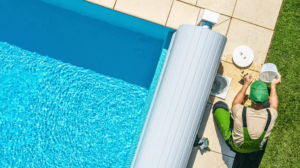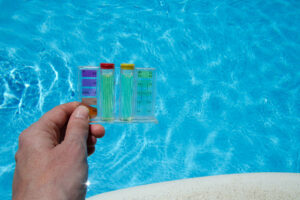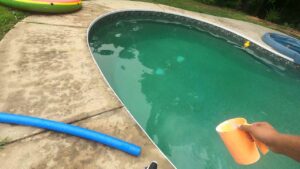Introduction
Imagine this: It’s a warm summer afternoon in Pennsylvania, and you’re lounging by your backyard pool. The water sparkles under the sun, inviting you to take a refreshing dip. But wait—what kind of pool are you swimming in? Is it a saltwater pool or a chlorine pool? And does it even matter?
Choosing between saltwater pools and chlorine pools is one of the most common dilemmas homeowners face when installing or upgrading their swimming pools. Both options have their pros and cons, but which one aligns with your lifestyle, budget, and maintenance preferences? Let’s dive into the details so you can make an informed decision.
1. Understanding Saltwater Pools vs. Chlorine Pools
Before we compare the two, let’s clarify what each type entails:
- Chlorine Pools : These use traditional chlorine tablets or liquid chlorine to sanitize the water. Chlorine kills bacteria, algae, and other contaminants, keeping the water clean and safe for swimming choosing between saltwater and chlorine pools
- Saltwater Pools : Despite their name, these pools aren’t filled with ocean-like salty water. Instead, they use a salt chlorinator system that converts salt (sodium chloride) into chlorine through electrolysis. This process creates a gentler form of chlorine, reducing the need for harsh chemicals.
Now that we’ve defined them, let’s explore the key differences.
2. Cost Comparison: Upfront and Long-Term Expenses
One of the biggest factors in choosing between saltwater pools and chlorine pools is cost. Here’s how they stack up:
| Factor | Saltwater Pools | Chlorine Pools |
| Initial Installation | Higher upfront cost (~$2,000-$4,000 extra for equipment) | Lower upfront cost (standard filtration systems) |
| Ongoing Maintenance | Lower chemical costs over time | Regular chlorine purchases increase expenses |
| Equipment Lifespan | Longer lifespan with proper care | Shorter lifespan due to chemical wear |
Key Takeaway: While saltwater pools require a higher initial investment, they often save money in the long run due to reduced chemical expenses. If you’re looking for affordability upfront, chlorine pools might be more appealing. cost of installing a new pool
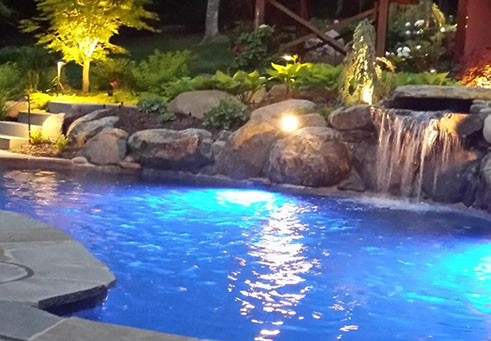
3. Maintenance Requirements
No one wants to spend their weekends scrubbing pool tiles or testing water chemistry. Let’s break down the maintenance needs of both types.
Saltwater Pools
- Minimal chemical handling; the salt chlorinator does most of the work.
- Softer water feels better on skin and eyes.
- Fewer pH fluctuations compared to chlorine pools.
- Salt cells need periodic cleaning and replacement (every 3-7 years).
- Initial setup requires technical expertise.
Chlorine Pools
- Simple and straightforward maintenance routines.
- Widely available supplies at local stores.
Requires frequent testing and balancing of chemicals.
- ensuring proper water quality and safety
- maintaining proper chemical balance in your pool
- Harsh chemicals can irritate skin and eyes if not properly managed.
Pro Tip: If you dislike the idea of constant upkeep, a saltwater pool might be worth the investment. However, if you enjoy hands-on pool care or want simplicity, chlorine pools could suit you better.
4. Water Quality and Comfort
When it comes to swimming experience, water quality plays a huge role. How do saltwater pools vs. chlorine pools measure up?
- Saltwater Pools :
- Water feels smoother and less abrasive on the skin.
Reduced risk of red eyes, dry skin, and allergic reactions.
- how chlorine helps keep pool water safe )
- Ideal for families with sensitive skin or allergies.
- Chlorine Pools :
- Can cause irritation if chlorine levels are too high.
- Strong chemical smell may deter some swimmers.
- Requires careful monitoring to maintain comfort.
Analogy Alert! Think of saltwater pools as a spa-like experience—gentle and soothing—while chlorine pools are like a no-frills gym shower—functional but sometimes harsh.
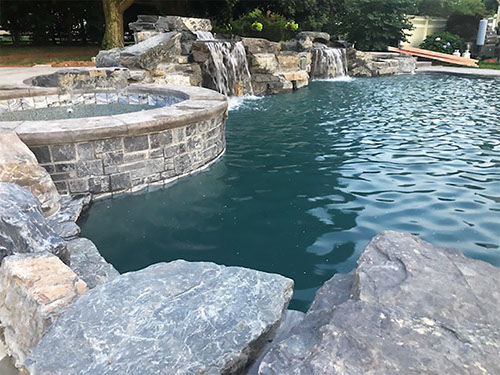
5. Environmental Impact
As environmentally conscious homeowners, many Pennsylvanians prioritize eco-friendly choices. Here’s how these pool types compare:
- Saltwater Pools :
- Use fewer chemicals, making them slightly greener.
Saltwater systems consume electricity, but advancements in energy-efficient models mitigate this concern.
- energy-efficient pool systems for sustainability
saving money over time with eco-friendly pools - Chlorine Pools :
- Rely heavily on manufactured chemicals, which can harm aquatic ecosystems if improperly disposed of.
- Require larger quantities of plastic packaging for chlorine products.
Fun Fact: Some modern salt chlorinators come with solar-powered options, further reducing their carbon footprint!
6. FAQs About Saltwater vs. Chlorine Pools
Let’s address some burning questions you might have:
Q1: Are saltwater pools completely free of chlorine?
No, they still produce chlorine—but in smaller, gentler amounts via the salt chlorinator.
Q2: Do saltwater pools taste salty?
Not really! The salt concentration is much lower than seawater, so it’s barely noticeable.
Q3: Can I switch from a chlorine pool to a saltwater pool?
Absolutely! Many homeowners retrofit their existing pools with salt chlorinators.
upgrading an existing pool system
Q4: Which type is better for resale value?
Both have appeal, but saltwater pools are increasingly popular among buyers due to their perceived luxury and low maintenance.
7. Making the Decision: What’s Best for You?
Here’s a quick checklist to help you decide:
- Choose a Saltwater Pool If :
- You value comfort and minimal maintenance.
- You’re willing to invest more upfront for long-term savings.
- You prefer a gentler swimming experience.
- Choose a Chlorine Pool If :
- You’re working within a tight budget.
- You don’t mind regular chemical treatments.
- You prioritize simplicity and familiarity.
Conclusion
So, which is right for you—saltwater pools vs. chlorine pools ? Ultimately, the answer depends on your priorities. If you crave convenience, comfort, and sustainability, a saltwater pool might be your perfect match. On the other hand, if you seek affordability and ease of access, a chlorine pool remains a solid choice.
Ready to transform your backyard into a personal oasis? Whether you’re leaning toward a saltwater pool or sticking with chlorine, our team of trusted pool professionals in Pennsylvania is here to help. From installation to maintenance, we’ll guide you every step of the way. Contact us today for a free consultation and start planning the pool of your dreams! designing a dream backyard oasis , finding reliable pool builders in Pennsylvania

